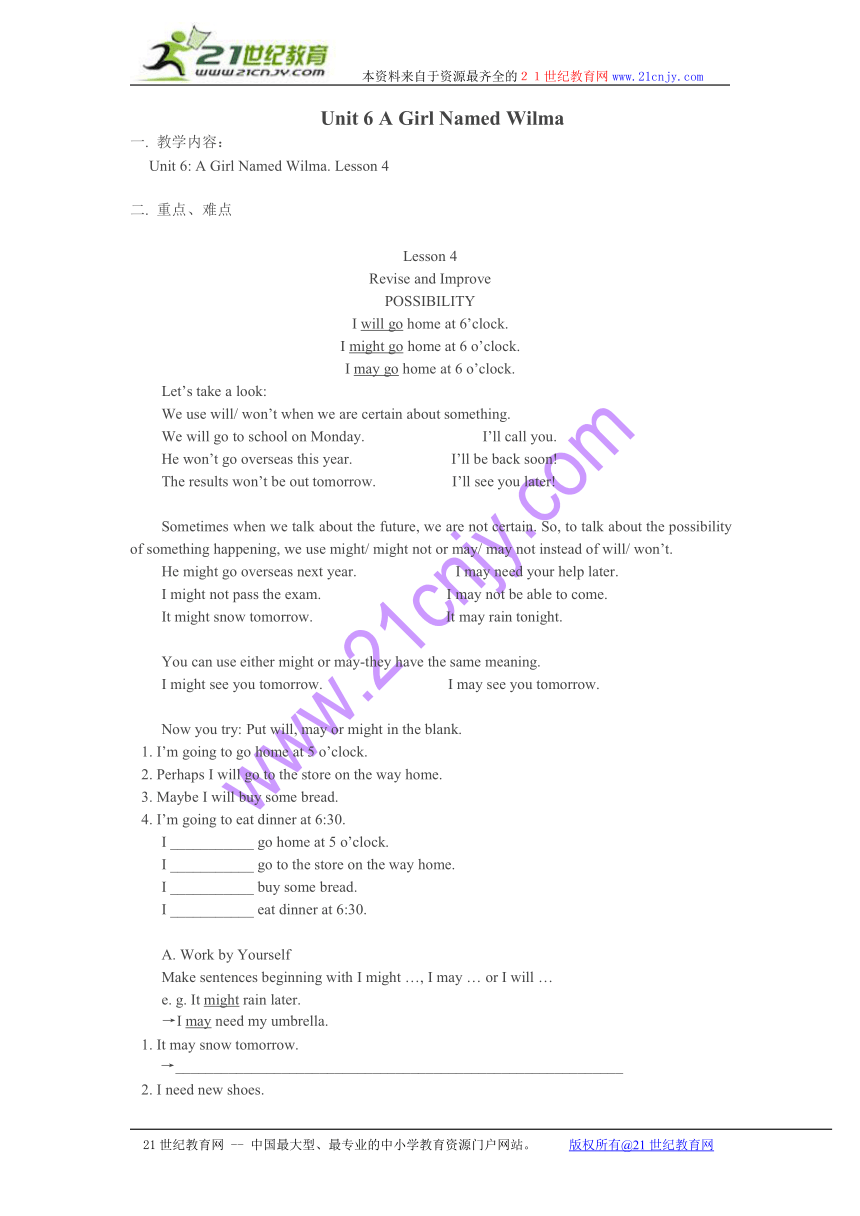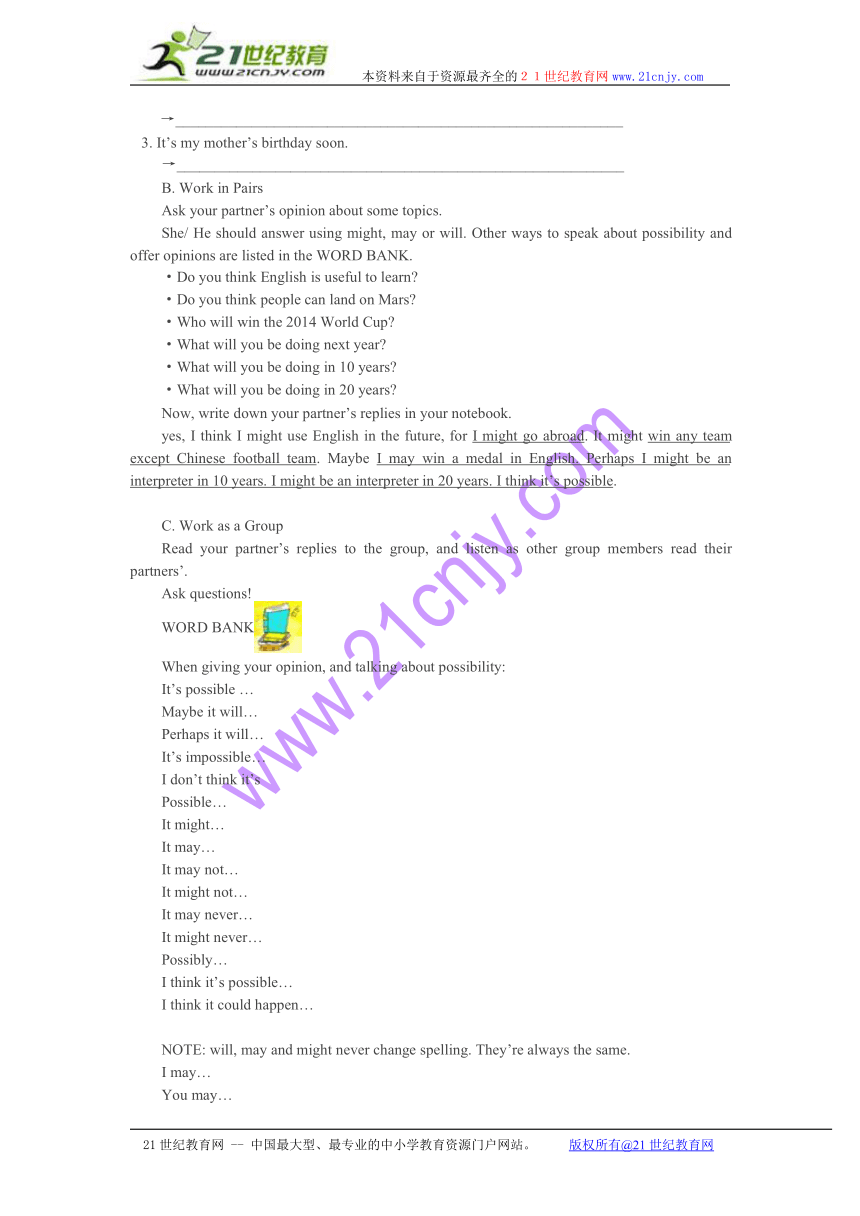英语:unit 6 a girl named wilma lesson 4重难点解析(教科版九年级下)
文档属性
| 名称 | 英语:unit 6 a girl named wilma lesson 4重难点解析(教科版九年级下) |

|
|
| 格式 | rar | ||
| 文件大小 | 15.6KB | ||
| 资源类型 | 教案 | ||
| 版本资源 | 教科版 | ||
| 科目 | 英语 | ||
| 更新时间 | 2010-01-21 13:22:00 | ||
图片预览


文档简介
本资料来自于资源最齐全的21世纪教育网www.21cnjy.com
Unit 6 A Girl Named Wilma
一. 教学内容:
Unit 6: A Girl Named Wilma. Lesson 4
二. 重点、难点
Lesson 4
Revise and Improve
POSSIBILITY
I will go home at 6’clock.
I might go home at 6 o’clock.
I may go home at 6 o’clock.
Let’s take a look:
We use will/ won’t when we are certain about something.
We will go to school on Monday. I’ll call you.
He won’t go overseas this year. I’ll be back soon!
The results won’t be out tomorrow. I’ll see you later!
Sometimes when we talk about the future, we are not certain. So, to talk about the possibility of something happening, we use might/ might not or may/ may not instead of will/ won’t.
He might go overseas next year. I may need your help later.
I might not pass the exam. I may not be able to come.
It might snow tomorrow. It may rain tonight.
You can use either might or may-they have the same meaning.
I might see you tomorrow. I may see you tomorrow.
Now you try: Put will, may or might in the blank.
1. I’m going to go home at 5 o’clock.
2. Perhaps I will go to the store on the way home.
3. Maybe I will buy some bread.
4. I’m going to eat dinner at 6:30.
I ___________ go home at 5 o’clock.
I ___________ go to the store on the way home.
I ___________ buy some bread.
I ___________ eat dinner at 6:30.
A. Work by Yourself
Make sentences beginning with I might …, I may … or I will …
e. g. It might rain later.
→I may need my umbrella.
1. It may snow tomorrow.
→___________________________________________________________
2. I need new shoes.
→___________________________________________________________
3. It’s my mother’s birthday soon.
→___________________________________________________________
B. Work in Pairs
Ask your partner’s opinion about some topics.
She/ He should answer using might, may or will. Other ways to speak about possibility and offer opinions are listed in the WORD BANK.
·Do you think English is useful to learn
·Do you think people can land on Mars
·Who will win the 2014 World Cup
·What will you be doing next year
·What will you be doing in 10 years
·What will you be doing in 20 years
Now, write down your partner’s replies in your notebook.
yes, I think I might use English in the future, for I might go abroad. It might win any team except Chinese football team. Maybe I may win a medal in English. Perhaps I might be an interpreter in 10 years. I might be an interpreter in 20 years. I think it’s possible.
C. Work as a Group
Read your partner’s replies to the group, and listen as other group members read their partners’.
Ask questions!
WORD BANK
When giving your opinion, and talking about possibility:
It’s possible …
Maybe it will…
Perhaps it will…
It’s impossible…
I don’t think it’s
Possible…
It might…
It may…
It may not…
It might not…
It may never…
It might never…
Possibly…
I think it’s possible…
I think it could happen…
NOTE: will, may and might never change spelling. They’re always the same.
I may…
You may…
He may…
She may…
It may…
We may…
They may…
三. 具体内容:
课文讲解:
Listen and Speak Conversations in Context
A. Exchange the underlined expressions with the new ones on the right. Practice the dialogue with your partner.
A: What is the problem ·In what way are you sick
B: I have a stomachache. It’s terrible. ·What is the matter with you
A: Oh, I see. When would you like to come in ·What time can you come
B: Well, as soon as possible. I can come at any time. ·What time is convenient for you
B. You visit the doctor because you don’t feel well. Practice the dialogue with your partner. Change the dialogue around each time.
A: How long have you been feeling sick ·What’s the matter with you
B: About three days. But It started getting ·What are your symptoms
worse today.
A: I see. What seems to be the problem ·I’ll prescribe some drugs.
B: I have a bad cough and my throat hurts. ·Here’s a prescription for some
medicine that will help.
A: I’m going to recommend some medicine. ·
And you should drink a lot of liquids. ·
B: Okay, doctor.
·I have a headache. ——You should lie down and take it easy.
·I have a stomachache. ——You should have some soup.
·I have a runny nose and I’m sneezing a lot. ——You should stay in bed until you feel better.
【典型例题】
( )1. You’d better ________ smoking, ________ you will get ill.
A. go on, so B. give up, and
C. give up, or
解析:选B。你最好放弃吸烟,否则你会生病的。so表因果关系,and表并列关系。
( )2. The geography teacher told us yesterday that the earth ____________ around the sun.
A. move B. moves C. has moved D. is moving
解析:选B。在宾语从句中,当主句是一般过去时时,从句是客观事实或普遍真理,应使用一般现在时。
( )3. What do you think _________ solve the problem
A. you can do B. can you do C. you can do to
解析:选C。本题是对不定式的考查,句中不定式做目的状语。
( )4. ——Must we finish giving out the posters today
——Yes, we ________. It can’t be put off any longer.
A. can B. may C. must
解析:选C。must的肯定回答为must,否定回答为needn’t。may的肯定回答为may或can,否定回答为mustn’t或can’t。
21世纪教育网 -- 中国最大型、最专业的中小学教育资源门户网站。 版权所有@21世纪教育网
Unit 6 A Girl Named Wilma
一. 教学内容:
Unit 6: A Girl Named Wilma. Lesson 4
二. 重点、难点
Lesson 4
Revise and Improve
POSSIBILITY
I will go home at 6’clock.
I might go home at 6 o’clock.
I may go home at 6 o’clock.
Let’s take a look:
We use will/ won’t when we are certain about something.
We will go to school on Monday. I’ll call you.
He won’t go overseas this year. I’ll be back soon!
The results won’t be out tomorrow. I’ll see you later!
Sometimes when we talk about the future, we are not certain. So, to talk about the possibility of something happening, we use might/ might not or may/ may not instead of will/ won’t.
He might go overseas next year. I may need your help later.
I might not pass the exam. I may not be able to come.
It might snow tomorrow. It may rain tonight.
You can use either might or may-they have the same meaning.
I might see you tomorrow. I may see you tomorrow.
Now you try: Put will, may or might in the blank.
1. I’m going to go home at 5 o’clock.
2. Perhaps I will go to the store on the way home.
3. Maybe I will buy some bread.
4. I’m going to eat dinner at 6:30.
I ___________ go home at 5 o’clock.
I ___________ go to the store on the way home.
I ___________ buy some bread.
I ___________ eat dinner at 6:30.
A. Work by Yourself
Make sentences beginning with I might …, I may … or I will …
e. g. It might rain later.
→I may need my umbrella.
1. It may snow tomorrow.
→___________________________________________________________
2. I need new shoes.
→___________________________________________________________
3. It’s my mother’s birthday soon.
→___________________________________________________________
B. Work in Pairs
Ask your partner’s opinion about some topics.
She/ He should answer using might, may or will. Other ways to speak about possibility and offer opinions are listed in the WORD BANK.
·Do you think English is useful to learn
·Do you think people can land on Mars
·Who will win the 2014 World Cup
·What will you be doing next year
·What will you be doing in 10 years
·What will you be doing in 20 years
Now, write down your partner’s replies in your notebook.
yes, I think I might use English in the future, for I might go abroad. It might win any team except Chinese football team. Maybe I may win a medal in English. Perhaps I might be an interpreter in 10 years. I might be an interpreter in 20 years. I think it’s possible.
C. Work as a Group
Read your partner’s replies to the group, and listen as other group members read their partners’.
Ask questions!
WORD BANK
When giving your opinion, and talking about possibility:
It’s possible …
Maybe it will…
Perhaps it will…
It’s impossible…
I don’t think it’s
Possible…
It might…
It may…
It may not…
It might not…
It may never…
It might never…
Possibly…
I think it’s possible…
I think it could happen…
NOTE: will, may and might never change spelling. They’re always the same.
I may…
You may…
He may…
She may…
It may…
We may…
They may…
三. 具体内容:
课文讲解:
Listen and Speak Conversations in Context
A. Exchange the underlined expressions with the new ones on the right. Practice the dialogue with your partner.
A: What is the problem ·In what way are you sick
B: I have a stomachache. It’s terrible. ·What is the matter with you
A: Oh, I see. When would you like to come in ·What time can you come
B: Well, as soon as possible. I can come at any time. ·What time is convenient for you
B. You visit the doctor because you don’t feel well. Practice the dialogue with your partner. Change the dialogue around each time.
A: How long have you been feeling sick ·What’s the matter with you
B: About three days. But It started getting ·What are your symptoms
worse today.
A: I see. What seems to be the problem ·I’ll prescribe some drugs.
B: I have a bad cough and my throat hurts. ·Here’s a prescription for some
medicine that will help.
A: I’m going to recommend some medicine. ·
And you should drink a lot of liquids. ·
B: Okay, doctor.
·I have a headache. ——You should lie down and take it easy.
·I have a stomachache. ——You should have some soup.
·I have a runny nose and I’m sneezing a lot. ——You should stay in bed until you feel better.
【典型例题】
( )1. You’d better ________ smoking, ________ you will get ill.
A. go on, so B. give up, and
C. give up, or
解析:选B。你最好放弃吸烟,否则你会生病的。so表因果关系,and表并列关系。
( )2. The geography teacher told us yesterday that the earth ____________ around the sun.
A. move B. moves C. has moved D. is moving
解析:选B。在宾语从句中,当主句是一般过去时时,从句是客观事实或普遍真理,应使用一般现在时。
( )3. What do you think _________ solve the problem
A. you can do B. can you do C. you can do to
解析:选C。本题是对不定式的考查,句中不定式做目的状语。
( )4. ——Must we finish giving out the posters today
——Yes, we ________. It can’t be put off any longer.
A. can B. may C. must
解析:选C。must的肯定回答为must,否定回答为needn’t。may的肯定回答为may或can,否定回答为mustn’t或can’t。
21世纪教育网 -- 中国最大型、最专业的中小学教育资源门户网站。 版权所有@21世纪教育网
同课章节目录
